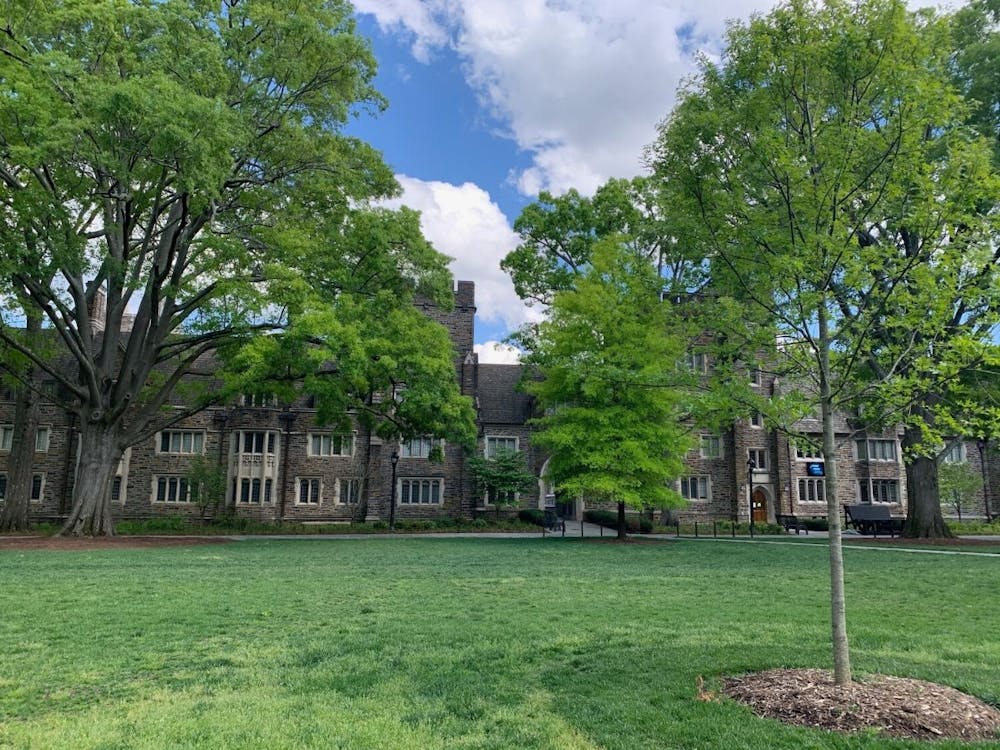All Duke sports programs are outstanding, and its chess club is no exception—this year, the Duke University Chess Club brought home $1,450 in total earnings from the Collegiate Chess League’s fall season.
DUChess is an organization that uses chess as a social and competitive activity to bring students together. Duke previously had a chess club that became inactive, so the club was rechartered as DUChess at the end of the spring 2021 semester, according to junior and DUChess President Naga Rudrapatna.
This year was DUChess’s second time competing in the CCL, which was in its third annual season. DUChess’s five teams competed with 154 other teams from 79 colleges and 13 countries.
Teams were divided into 10 divisions based on skill. The first stage of the season was the “regular season,” where teams played in a round-robin tournament. The second stage consisted of “playoffs,” which consisted of a single-elimination bracket per division. To qualify for playoffs, teams had to be in the top six of their division in the regular season. Matches were held online and broadcast live on Twitch.
Three Duke teams qualified for semifinals in their respective divisions and won monetary awards: Teams A, C and D. Team A came in fourth in Division 2, Team C won first in Division 5 and Team D won third place in Division 6. Team E was eliminated in the regular season and B was eliminated in the first round of playoffs.
Team A was captained by first-year master of economics student Zubin Baliga and consisted of political science exchange student Sebastian Boehme, sophomore Luke Triplett, sophomore Jeff Du, first-year master of global health student Benjamin Mukumbya and substitute first-year Alton Mies. They went 4-3 in the regular season, beating teams from Carnegie Mellon University, Temple University and University of Toronto.
In the playoffs, Duke Team A ousted University of California Berkeley Team B and University of Benin before falling to University of Illinois Urbana-Champaign Team A and University of California Los Angeles Team A in the semifinals and third-place matches. They won $500 as a result.
Team C was captained by Rudrapatna and consisted of junior Rishi Rajendran, junior Kevin Ordet, junior William Strong and substitute first-year Matthew Song. They went 6-1 in the regular season, beating teams from Yale University, Toronto and Bangladesh and only losing to Université de Franche-Comté Sciences et Techniques Team A.
In the playoffs, Team C defeated University of Florida Team B and Drexel University Team A. In the rematch against Université de Franche-Comté Sciences et Techniques A, they edged the win 8.5-7.5 and brought home the 1st place prize of $750.
Team D was captained by sophomore Andy He and consisted of first-year Chase Frutos, junior Jack Kochansky, sophomore Vignesh Pirapaharan and substitute first-year Yuren Cao. They went 5-2 in the regular season, defeating teams from Massachusetts Institute of Technology, Georgia Institute of Technology and Purdue University.
In the playoffs, Team D defeated UCLA Team C and University of California San Diego Team B but lost their rematch against Georgia Tech B in the semifinals. Luckily, in the third-place match, they defeated Carnegie Mellon Team B, whom they lost to in the group stage. They won $200 as a result.
“After getting into the playoffs, I thought our team was pretty strong. I thought we had a good chance of either getting second or third,” He said. “When we lost to Georgia Tech, it was a little bit of a morale blow. But we pulled together and we still beat Carnegie Mellon.
He thought CCL’s fall season was just a fun way to meet people and play chess—he did not know winning came with cash prizes.
“I only found out after we got into the playoffs. And then Naga was like, ‘Look, there’s cash prizes!’ and I was like, what?” He said.
This year, CCL was able to have larger prize funds due to its collaboration with the Collegiate Esports Association according to Rudrapatna.
Rudrapanta is “very proud” of the club’s overall performance, and said the club will restructure the team next semester so they can do even better.
“I think the future [of the club] is definitely bright. I think amongst the competition we had probably one of the strongest programs overall. We had the most teams in the semifinals out of a school,” Rudrapanta said.
Rudrapatna hopes that DUChess will compete in the 2022 Pan American Intercollegiate Team Championships, which are held in January. In the meantime, the club is participating in smaller tournaments, he said.
Get The Chronicle straight to your inbox
Sign up for our weekly newsletter. Cancel at any time.

Katie Tan is a Trinity senior and digital strategy director of The Chronicle's 119th volume. She was previously managing editor for Volume 118.

